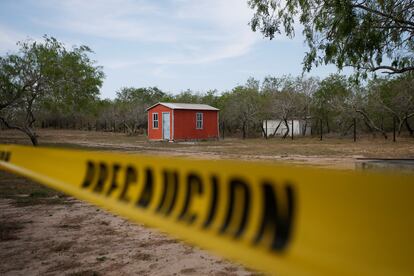US spied on the Gulf Cartel after four Americans were abducted in Tamaulipas
According to leaked documents accessed by ‘The Washington Post,’ authorities in the United States wiretapped conversations between members of the criminal organization, who were suspected of kidnapping the tourists

American intelligence agencies spied on the Gulf Cartel last March after four U.S. citizens were kidnapped in the Mexican city of Matamoros, in the border state of Tamaulipas, according to The Washington Post, which has had access to classified documents and recordings from U.S. authorities. The news comes a few days after it was revealed that the U.S. Drug Enforcement Administration (DEA) had infiltrated the Mexican criminal group Los Chapitos, a faction of the Sinaloa Cartel that is controlled by the sons of Joaquín “El Chapo” Guzmán. The revelations have heightened tension between the U.S. and Mexico, which has condemned the DEA’s actions as an “abusive interference.”
The four American citizens entered Mexico on March 3. Their families told U.S. media that one of the women had scheduled cosmetic surgery in Mexico, and her three friends had joined her on the trip. But upon entering Matamoros, the four got lost and drove around the city until several vehicles began to follow them. Videos shared on social networks showed a shooting and then the group — three of whom were unconscious — being loaded into a truck by armed men, who drove off. Four days later, authorities found the Americans — two alive and two dead — in a wooden shed on the outskirts of Matamoros, near Playa Bagdad.

During the days that the Americans were missing, the FBI announced a reward of $50,000 for anyone who could provide information leading to their whereabouts. The White House condemned the kidnapping, and National Security Council spokesperson John Kirby said: “Attacks on U.S. citizens are unacceptable, no matter where or under what circumstances they occur.” Now it has been revealed that during this period, U.S. authorities also tracked members of the Gulf Cartel, who were suspected of kidnapping the tourists.
According to the leaked information to which the Post had access, the U.S. wiretapped conversations between members of the Gulf Cartel. In these talks, the cartel members discussed how the Mexican armed forces might respond to the kidnapping, flagging “possible arrests” and a rise of “violence in Matamoros.” In the intercepted conversations, the criminal organization also spoke to affiliated lawyers, who told them to remove all information related to the kidnapping from their cellphones.
The classified documents on the U.S. wiretaps were leaked along with other confidential files — such as military reports on the war in Ukraine — on Discord, a messaging application similar to Slack or Microsoft Teams that is popular among video game fans. With respect to the information from Mexico, the documents indicate that the U.S. tourists were attacked “in retaliation for an alleged hit-and-run incident,” according to The Washington Post. The wiretaps — which were authorized by the U.S. Justice Department — state that it was the criminals themselves who handed over the group to the Mexican authorities.

This last piece of information is in line with what the two survivors told CNN in an interview upon their return to the U.S. Latavia McGee and Eric James Williams said that their captors left them in a wooden shack on March 6, where they were found a day later by Mexican security forces. Mexican authorities have not explained why they searched the shack on the morning of March 7, given the site had already been cleared. McGee and Willliams also said that one of the kidnappers admitted that the attack had been a mistake, made under the influence of drugs and alcohol.
From the start, the Matamoros case threatened to spark a diplomatic crisis. The kidnapping triggered widespread criticisms from the Republican Party, which was directed at both the Joe Biden administration and the Mexican government of Andrés Manuel López Obrador. Members of the party’s most far-right wing even proposed a bill that would enable the U.S. military to deploy troops on Mexican territory and label cartels as terror organizations.
These attacks were not well-received by Mexican authorities. The kidnapping marked the start of a tense few weeks between Mexico and the U.S., with drug trafficking as the central issue of contention. Just a few days ago, the DEA revealed that it had “proactively infiltrated the Sinaloa Cartel and the Chapitos network,” which is accused of trafficking fentanyl into the United States.
“How can they be spying?” López Obrador asked Monday in his daily press conference, arguing the actions amounted to “arrogant” and “abusive interference” that “mustn’t be accepted under any circumstances.”
The Mexican president has been insisting for months that U.S. authorities cannot carry out investigations on Mexican territory, as they did under other previous governments. “There can’t be foreign agents in our country,” he said on Monday, adding that while he will not accept any outside meddling in national security, he is open to negotiation.
Sign up for our weekly newsletter to get more English-language news coverage from EL PAÍS USA Edition
Tu suscripción se está usando en otro dispositivo
¿Quieres añadir otro usuario a tu suscripción?
Si continúas leyendo en este dispositivo, no se podrá leer en el otro.
FlechaTu suscripción se está usando en otro dispositivo y solo puedes acceder a EL PAÍS desde un dispositivo a la vez.
Si quieres compartir tu cuenta, cambia tu suscripción a la modalidad Premium, así podrás añadir otro usuario. Cada uno accederá con su propia cuenta de email, lo que os permitirá personalizar vuestra experiencia en EL PAÍS.
¿Tienes una suscripción de empresa? Accede aquí para contratar más cuentas.
En el caso de no saber quién está usando tu cuenta, te recomendamos cambiar tu contraseña aquí.
Si decides continuar compartiendo tu cuenta, este mensaje se mostrará en tu dispositivo y en el de la otra persona que está usando tu cuenta de forma indefinida, afectando a tu experiencia de lectura. Puedes consultar aquí los términos y condiciones de la suscripción digital.









































